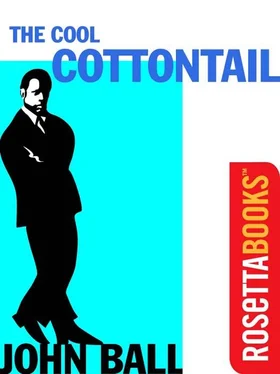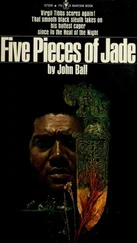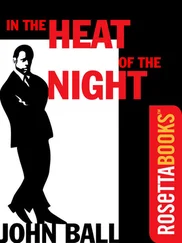John Ball - The Cool Cottontail
Здесь есть возможность читать онлайн «John Ball - The Cool Cottontail» весь текст электронной книги совершенно бесплатно (целиком полную версию без сокращений). В некоторых случаях можно слушать аудио, скачать через торрент в формате fb2 и присутствует краткое содержание. Год выпуска: 1966, ISBN: 1966, Издательство: RosettaBooks, Жанр: Полицейский детектив, на английском языке. Описание произведения, (предисловие) а так же отзывы посетителей доступны на портале библиотеки ЛибКат.
- Название:The Cool Cottontail
- Автор:
- Издательство:RosettaBooks
- Жанр:
- Год:1966
- ISBN:978-0-7953-1757-6
- Рейтинг книги:5 / 5. Голосов: 1
-
Избранное:Добавить в избранное
- Отзывы:
-
Ваша оценка:
- 100
- 1
- 2
- 3
- 4
- 5
The Cool Cottontail: краткое содержание, описание и аннотация
Предлагаем к чтению аннотацию, описание, краткое содержание или предисловие (зависит от того, что написал сам автор книги «The Cool Cottontail»). Если вы не нашли необходимую информацию о книге — напишите в комментариях, мы постараемся отыскать её.
The Cool Cottontail — читать онлайн бесплатно полную книгу (весь текст) целиком
Ниже представлен текст книги, разбитый по страницам. Система сохранения места последней прочитанной страницы, позволяет с удобством читать онлайн бесплатно книгу «The Cool Cottontail», без необходимости каждый раз заново искать на чём Вы остановились. Поставьте закладку, и сможете в любой момент перейти на страницу, на которой закончили чтение.
Интервал:
Закладка:
Tibbs shook hands and left. Halfway across the yard he saw a golf-ball-sized stone in his path, drew back his right foot, and kicked at it with vicious power. He missed a square-on kick; the stone skidded a few feet to the side and stopped.
He got into his car and sat motionless for a moment, his frustration settling in him like a huge leaden lump. “Damn,” he said between his teeth. He was in no fit mood for anything as he drove toward the civic center and his waiting office.
chapter 6
For the next twenty-four hours Virgil Tibbs lived in a world of hope. He kept a close and continuous vigil over all sources of information concerning missing persons and reviewed crime reports in the hope of finding some faint connection with the body in the pool. He checked with other law-enforcement agencies throughout California, Nevada, and Arizona. At the end of another day of concentrated effort he drew a complete and absolute blank.
Meanwhile in the morgue in San Bernardino the body of an unknown man rested on a slab, unclaimed and yielding no clue that might lead to an identification. The most frustrating thing about the whole stalemate was that no one seemed to care. No anxious wife phoned in anywhere to ask about a missing husband; no business associates made inquiry. The man, whoever he had been, seemed to have lived in a vacuum.
People, Tibbs decided, seldom gave a damn about one another. Landlords weren’t concerned about their tenants so long as the rent was paid. Neighbors were not much inclined to be neighborly any more. Most car drivers had little sympathy for others on the road. And often when a serious crime had been committed, few citizens would come forward to help the police; they were too afraid of getting involved.
Tibbs thrust the image of such cases out of his mind. When things went against him, his brain seemed to delight in torturing him by exhuming every awkward and wretched incident he had ever known in his lifetime. They paraded in front of him, the zombies of things long since dead come back to haunt him. The mistakes be had made, the breaks that had gone against him, and the countless times he had been forced to accept humiliation he did not deserve simply because he was a Negro.
Inaction was killing him; he had to do something. The longer he sat in his office, the more likely it was that Captain Lindholm would drop in to ask how soon he would have the case closed. Finally, with no clear idea of what good would come of it, he got out his car, stopped for gas, and then turned eastward on Highway 66. He cleared the outskirts of Pasadena, passed the Santa Anita race track, and worked his way through Azusa. Then he picked up speed and rolled along the foothills of the mountains. The sun, which had been obscured by a low overcast, broke through when he passed Claremont and his spirits responded to the opening cheerfulness of the sky.
He turned off at the secondary road, drove another ten miles on the hardtop, and turned in at the entrance of Sun Valley Lodge. The chain was not up and he was able to negotiate the S turn through the shrubbery directly to the parking lot. Today several other cars were there; when he shut the engine off, he could hear the unmistakable sounds of children at play coming from the direction of the pool area.
He got out of the car wondering a little why he had come. On the surface he knew the answer; he had to find a new lead. But he admitted to himself that he had no idea where to look. He was convinced that the Nunns were on the level and were not holding out on him. A severe cross-examination, particularly on their premises, was not in order. He would therefore begin by asking if anything new had happened or been discovered. After they had said no to that, he would retrace everything again, looking for something he might have missed the first time.
He was only a few feet down the path that led to the house when Forrest arrived to greet him. Tibbs sensed instantly that his welcome was genuine.
“Hello, Virgil,” the park director said. “Pardon my using your first name, but that is the universal custom in nudist parks.”
“That’s fine,” Tibbs said. He noted that his host was again wearing bleached-out khaki shorts, apparently his standard costume for meeting visitors at the parking lot.
Forrest led the way into the big kitchen, where Emily was preparing an immense bowl of tomato-studded tossed salad. “Why, Virgil,” she greeted him. “How nice you’re back. You’ll have lunch with us, won’t you?”
“Yes, he will,” Forrest supplied before Tibbs could speak. He drew two cups of coffee and set them on the table.
Tibbs wanted to explain that this was an official call, not a social one. He opened his mouth to do so and then had sense enough to close it again. These people knew that, but they were treating him as a guest anyway. He was a person just like them, welcome to go anywhere and do anything that anyone else might do. It was like walking through the gates into Paradise.
He looked down at his ebony hands and hated them.
Carole came into the room, so well browned all over her smooth little body that apart from her blue eyes she might have been a distand relative of his. She greeted him with childish enthusiasm, and Tibbs, when he looked at her with his own dark-brown eyes, felt his heart stir.
Forrest helped him over a hurdle. “I know you want to talk to us, Virgil, and of course we’re available. If you could wait a few minutes until after lunch, it would help. We have guests on the grounds today.”
Tibbs agreed, realizing that he had unintentionally foisted himself on them for lunch. He should have said something about having already eaten, but at eleven-thirty in the morning it would have been unrealistic and they might have been offended. It was then he considered the fact that these people, being nudists, must have known the sting of prejudice, too. With them it was voluntary, but there must have been times when they had had to bear public ridicule and scorn. That would be the face it would wear, but their real transgression was the same one he was guilty of-being different. In a civilization where people who are different are sometimes richly rewarded, and even have temples built for them on the banks of the Potomac, he knew they are more often hated and despised for their lack of sameness.
Why, Tibbs wondered, is being exactly like everyone else so often taken for a great virtue? The world depended on people being different; otherwise it couldn’t run. There had to be leaders and there had to be workers. There had to be businessmen, artists, engineers, cops, architects, and people willing to work in slaughterhouses and rendering plants. There had to be farmers and possibly also politicians. People to do the imposing, exalted work and people to do the dirty, unpleasant work; and they couldn’t be the same people.
His thinking was interrupted when George came in. For a moment Tibbs felt the young man should have been wearing shorts in the presence of his mother. Virgil rose and greeted George a little awkwardly; his recent mental wandering had him off balance. “For gosh sakes, take off your coat, Virgil,” George urged. “It’s warm today and you don’t need all those clothes on.”
Then Tibbs realized that he felt strange not only because of his color, but also because he was fully dressed in a business suit in this place where attire was functional and no more. “I’d be glad to get rid of the coat,” he admitted. He removed it carefully and hung it across the back of his chair.
“We’ve got thirty-four now,” George informed his apron-clad mother. “Abe and Sarah came in and so did Don and Pam.”
Emily nodded and took it in her stride. “We prepare the food here,” Forrest explained, “and then take it over to the dining hall on weekdays, when it doesn’t pay to open up the big kitchen.”
Читать дальшеИнтервал:
Закладка:
Похожие книги на «The Cool Cottontail»
Представляем Вашему вниманию похожие книги на «The Cool Cottontail» списком для выбора. Мы отобрали схожую по названию и смыслу литературу в надежде предоставить читателям больше вариантов отыскать новые, интересные, ещё непрочитанные произведения.
Обсуждение, отзывы о книге «The Cool Cottontail» и просто собственные мнения читателей. Оставьте ваши комментарии, напишите, что Вы думаете о произведении, его смысле или главных героях. Укажите что конкретно понравилось, а что нет, и почему Вы так считаете.












